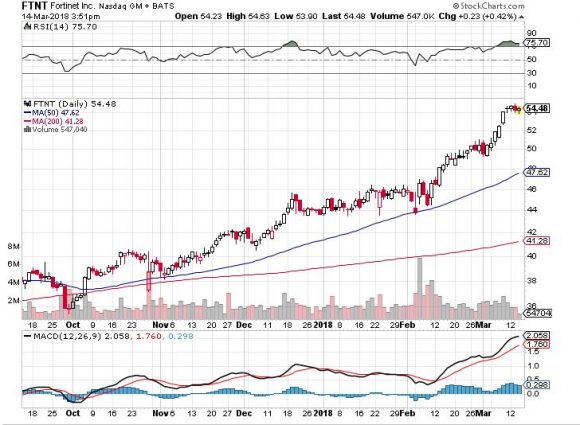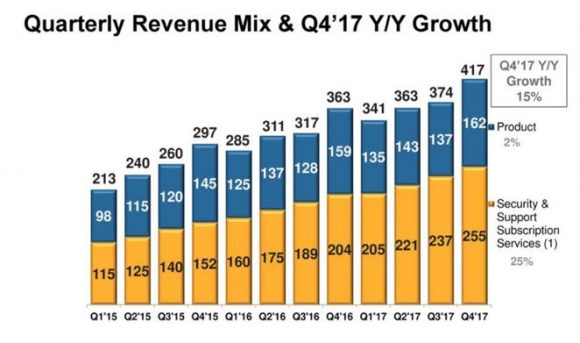The Stock that will Stop the Hacking Epidemic
If you like Palo Alto Networks, which the Mad Hedge Fund Trader has been recommending for years, you absolutely have to love Fortinet (FTNT), which can protect you from the most barbaric online intruders on a large scale.
Fortinet cloud security provides tailor-made protection for the Google (GOOGL) Cloud Platform, Microsoft (MSFT), AWS (Amazon Web Services), IBM (IBM) and Oracle (ORCL).
Cyberespionage is going from bad to worse, and shrewdly scaling into a few shares of Fortinet (FTNT) is prudent.
It's been a dreadful 12 months for corporate security.
First, Equifax (EFX) dropped a bomb, disclosing the data breach of 148 million Americans.
Then there was the Intel (INTC) chip debacle forcing companies to reanalyze in-house security operations thanks to a chip design flaw.
Not only is corporate intrusion becoming more vicious, it's also becoming more ubiquitous.
The Mad Hedge Fund Trader sympathizes because our website has been the victim of several invasive hacks over the years from places as diverse as Russia and Indonesia.
In an era of record corporate profits, companies are woefully unprepared for the digital danger.
As organizations transfer critical data to the cloud circulating among a myriad of collaborating employees, the opportunities for crooks to hack are high-yielding and fruitful.
Why do people hack big corporate firms?
The simple answer is for profit.
Hackers understand there is a secondary market on the dark web waiting patiently to purchase stolen data. The data in the shop window is cut from all shades of cloth.
What is the dark web?
It is part of the Internet, accessible by means of special software, allowing users and website operators to remain untraceable.
Many illegal products and services are bought and sold there. Hackers can catch a bid, cash out through this de facto marketplace, and retire to a five-star palatial resort in a country with no extradition treaty.
The incentive to soak up sensitive data from corporate America is stoking a colossal outbreak of corporate malfeasance and pushing up cybersecurity costs to $90 billion this year, up 19% from last year.
Focal points of security investment will be around cloud security, next generation firewall technology, email security, threat vulnerability and identity access management.
On a macro level, Washington is doubling down on the cybersecurity phenomenon. The definition of national security has expanded to include all domestic technology.
Persistent threats against national infrastructure, such as power grids, nuclear facilities and water supplies, are turbocharging security budgets to protect national assets against these sophisticated attacks.
Groundbreaking technology is guarded even more so than the entrance to Fort Knox. The vigilance is necessary considering that lost funds related to data intrusion will reach $8 trillion by 2020. An example is shipping magnate Maersk (AMKBF), which estimates the revenue lost from hackers in 2017 to be in the $200 million to $300 million range.
As hyper-accelerating technology goes into overdrive, the situation could turn perilous. By 2021, 46 billion devices will be connected through the IoT (Internet of Things) that could start with a smart toaster connected to an iPhone.
It's entirely possible that a hacker could gain control to the whole shebang by accessing a connected toaster and moving laterally through the ecosystem destroying at will. Don't laugh. This already has happened.
A programmed smart home is the next battleground between consumer and large cap tech.
This is the conundrum that companies face. Firms are investing robustly in top-notch cybersecurity, but hackers are staying one step ahead of the curve. They learn from mistakes and expand an evolving tool kit of techniques to destabilize a bigger swath of the economy.
The street is ignoring national security weakness related to tech because tech earnings are stellar. The market is closer than ever before to an inflection point. The "aha" moment will be when a Fortune 500 firm is toppled by one of these digital miscreants.
Russia's Kaspersky Lab came and went like nothing happened. The market is still immune to cyber hacks but all that could change. This Russian firm was pigeonholed as a Russian secret service affiliate.
Kaspersky Lab sells antivirus, Internet security, password management and endpoint security products. You might even see a sexy ad for its products on the margin of your computer screen right now.
Best Buy (BBY) reacted fast, removing Kaspersky products immediately. Russian national CEO Eugene Kaspersky vehemently denies any link with the Federal Security Service of the Russian Federation, even though he graduated from The Technical Faculty of the KGB Higher School and was a former Soviet military software engineer.?
Keeping with the trend, lawmakers applied pressure to AT&T (T), gutting a deal with Huawei, a Chinese telecom company, to sell smartphones through its retail dealership. The government has publicly advised Americans to avoid buying Chinese smartphones at all costs.
Regulation soon will blanket the tech industry from head to toe and the big winner is Fortinet.
Fortinet has a four-point plan to invigorate sales to even higher levels.
First, the core business of network security continues to offer growth in new, adjacent markets. FortiGate 6000 series will reap further market share gains. The 6000 series is the fastest next-generation firewall application among peers.
Second, increasing adoption of public cloud will push companies to Fortinet Security Fabric adoption. Safeguarding Wide Area Networking infrastructures that can reliably and efficiently connect branch offices to corporate resources and this technology is about a quarter of the business.
Third, cloud security is the fastest-growing segment. Fortinet delivers the most diverse portfolio of cloud security applications, all managed through a single, integrated management console with automated threat response and policy, unified control, workload visibility and management across all cloud environments.
Lastly, strengthening broad security to IoT and OT (operational technologies) environments is the last growth driver.
On the financial side, quarterly revenue drifted up to $417 million, up 15%, and revenue performance was bolstered by 25% YOY services revenue growth.
The shift toward higher-value security subscriptions and support services is the catalyst for a larger portion of revenue being deferred onto the balance sheet at a total of $1.336 billion, up 29% YOY.
As security techniques complicate, cybersecurity companies will have further demand to protect shareholder value.
To visit Fortinet's website, click here: https://www.fortinet.com/



